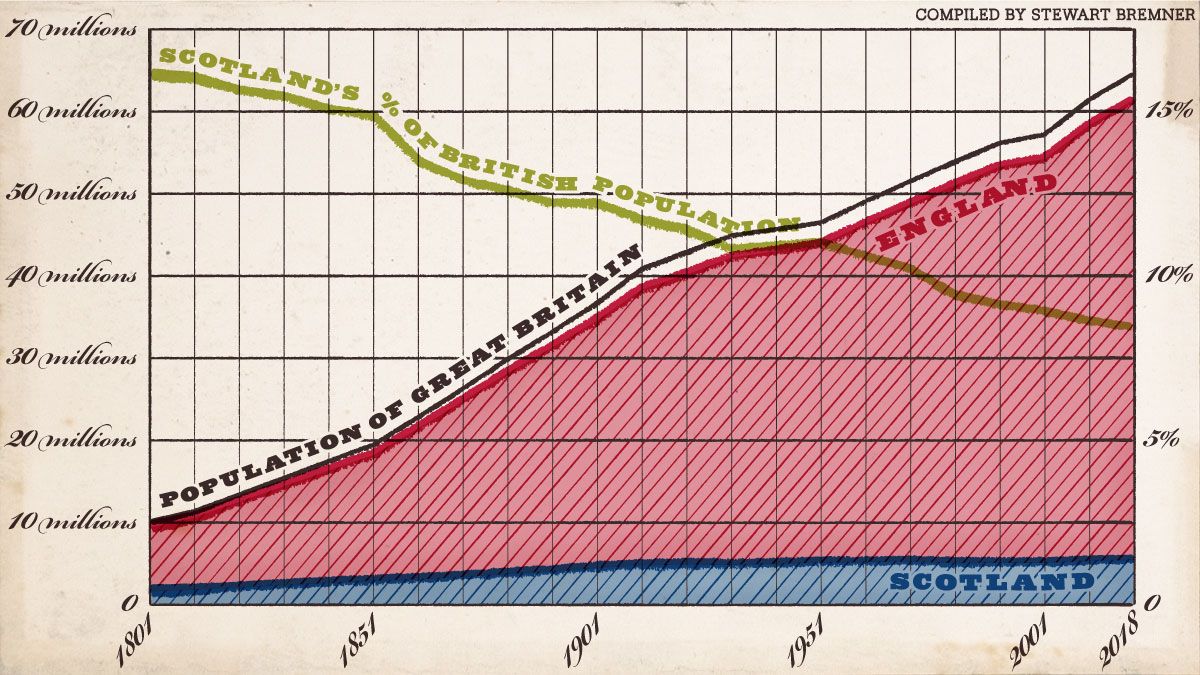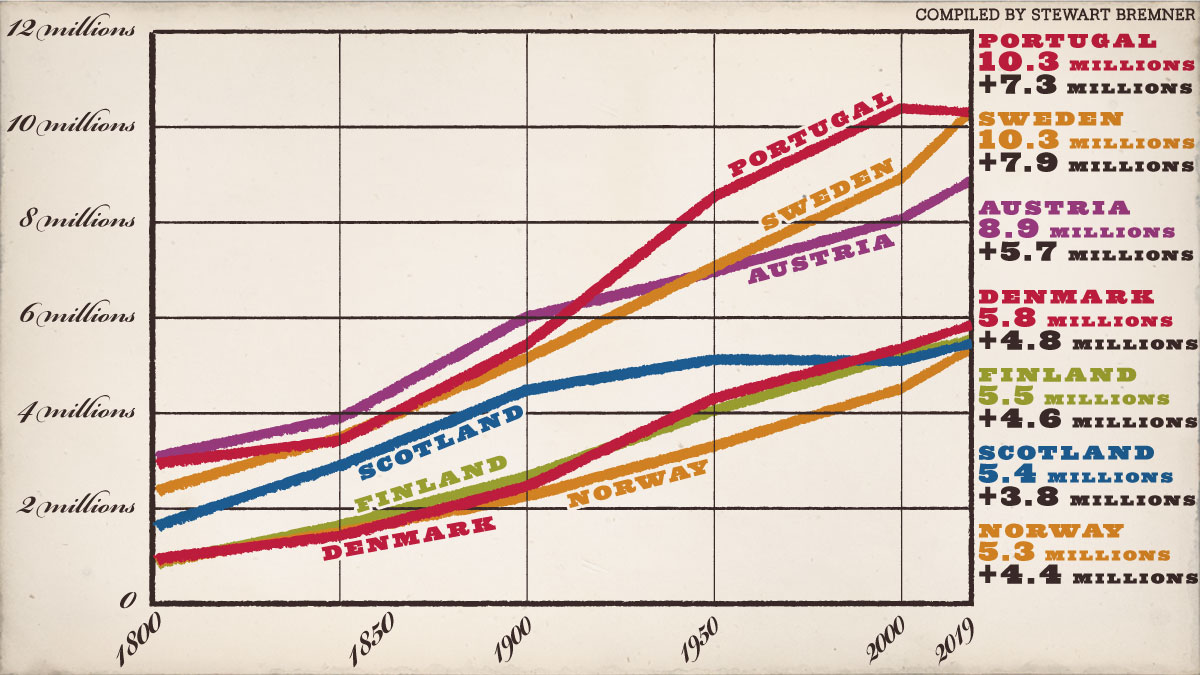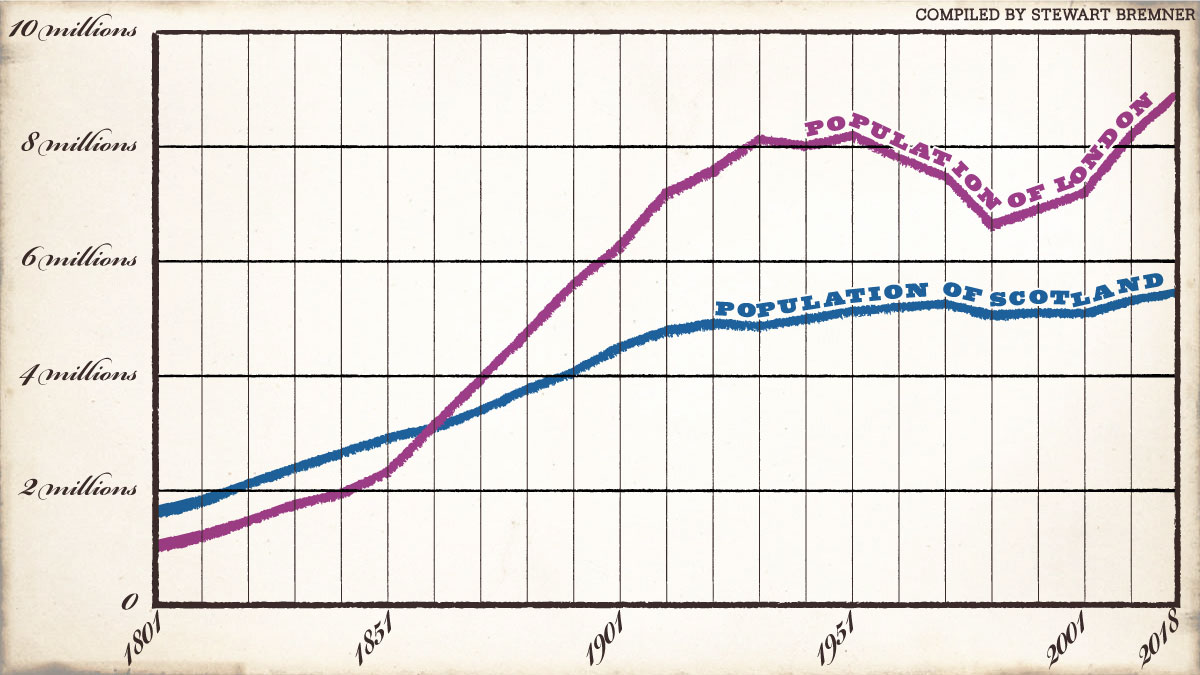The Population Bomb


Oftentimes, economic performance is used as the primary measure of a country’s success. It would be a good idea for us to stop relying on such measures, if we are to move forward – or even continue at all – as a society and as a species. Another way in which we might instead look at the success of a country is in the size of its population.
This is a crude measure and the impacts on population change are many and varied. However, it is possible to gain a basic understanding of whether people actually want to stay in a country, if we look at how population changes over time. Knowing if people wish to live in a country, or have children there, can be seen as an indication of the desirability of said country. Basically, the more people who want to live there, the nicer a place to live it most likely is.
Population sizes are usually taken in censuses. In 1755, Scotland is thought to have been one of the first countries after Roman times to have undertaken a census. As useful as the 1755 information is, it doesn’t tell us much without something to measure it against. Forward then to 1801, the first year that UK-wide censuses began to be carried out. We can use this to compare Scotland’s population performance against its closest neighbour. We can also see from this how well Scotland has fared in the Union.
In 1801, Scotland’s population was 1.6 million and England’s 7.7 million. As you can see from the first chart, England’s population has soared over time, compared to Scotland’s. In 2018 Scotland’s population had grown to 5.4 million and England’s a staggering 55.9 million.
Where England’s population had been 4.8 times larger than Scotland, it is now 10.3 times larger.
From the total population of the island of Great Britain, Scotland’s share fell from 16.2% in 1801 to 8.4% in 2018. Conversely, England’s rose from 77.9% to 86.7%. While some of the first 60 years of that may be attributed to the Clearances, the trend for Scotland has been ever downwards.
As a part of the United Kingdom, Scotland has been shrinking for over 200 years. What does that say about the desirability of Scotland? It would suggest that it’s shite being Scottish, so ye be best tae flit awa.
But what about other countries? If we look at similarly-sized European countries, the picture is not any better. We can see here six countries, chosen for their similar starting size and because, like Scotland, their geographical area barely changed over the time period.


In 1800, Finland was half Scotland’s size, it has now almost 100,000 more inhabitants. Sweden was then 1.5 times bigger than Scotland, it is now twice Scotland’s size. Compared to other similarly-sized European countries, Scotland does not appear to be a desirable place to stay.
One reason for this could be that over the period of the second table, only Scotland – a part of an unusual union – continually had the majority of its decisions made outwith its borders.
Given Scotland’s continually diminishing size – and therefore status – within that Union, it is entirely logical that Scotland has little say in the running of the Union. This makes it no surprise that, as a country, it is unable to create the conditions to retain and grow its population.
Scotland has little control over the internal policies that could make people want to stay here, or and have a family here. It has almost no control over the policies that could be used to attract people from other countries. This is especially clear in the current climate of intolerance emanating from the heart of the Union these days.
London, that beating heart, is also worth a quick comparison. When census records began, it was 1.6 times smaller than Scotland, with a population only slightly over one million. Today, it is 1.6 times bigger than Scotland.



Excellent stuff .Hopefully , this is the first in a series on the economic effects of being a virtual colony. Suggestion , how Ricardos Law will affect Scotland after Brexit.
So Scotland has grown, but not as much as other countries which are independent which have less resources than Scotland. Which means 2 things: 1, the effect of British rule has been detrimental to Scotland’s growth, and 2, the country is less damaged by the development and infrastructure of a rising population. There is also the fact that the relative increase of England’s population in relation to that of Scotland does not mean that Scotland cannot become independent.
Plus the cast iron certainty that there will be many people fleeing an England ravaged by the consequences of Brexit, many of whom would be attracted to an independent Scotland. These people would tend to be more open minded, qualified, talented and enterprising than those stuck in England.
“As a part of the United Kingdom, Scotland has been shrinking for over 200 years. What does that say about the desirability of Scotland? It would suggest that it’s shite being Scottish, so ye be best tae flit awa.”
No, it suggests that it’s shite being controlled by a bunch of ex public school posh boys, corporate crooks and their fascist politician sock puppets whose top priority is getting others to pay their share of the taxes needed to run a civilised country.
It is good to see that Scotland is managing to avoid contributing to the unsustainable growth in the population of the world.
It is not “managing to avoid” anything. It would be one thing if some sort of national self denial was in play that’s sole purpose was the maintenance of a steady population and demographic (impossible, and inhuman, to implement by the way), but that is not the case here. The Union has been so bad for Scotland that literally millions have had to leave over the years to earn a decent living. Ireland is an even better example of how bad the Union is for the peripheral nations. In 1850, Ireland’s population was over 8m. By the time they got their independence it had fallen to nearly 4m (it is now about 6.5m …. after the formation of the Republic). None of this was “management”. Quite the opposite …. by the govt of another country that had/has little interest in the well being of a specific peripheral “region” of its territories.
But becoming an ageing and eventually a collapsing society if neither reproduce sustainably nor are allowed to admit enough younger workers and families.
Also could mean our best talents are being head hunted by our colonial masters!
To my knowledge people tend to migrate to where there are better resources. Rivers, hunting, food to work and money. If there is a better living to be had in London than Lockerbie, then the mobile have incentive to go and seek their fortune (in theory at least). Those less mobile or without ambition tend to get stuck where they are. Rural Scotland is more about ‘quality’ of life rather than ‘quantity’ of life. You don’t tend to live where I am if you want to get rich, though the internet is now changing that to a degree. There are many factors in this complex subject to consider, as the saying goes “size isn’t everything!”.
A comparison of Scotland’s retail sector with the independent countries over the last sixty years would also be interesting.
A walk round shopping areas in Oslo, Vienna and Copenhagen gives the impression that they have not succumbed to the Big Brand international mid market Chain stores to the same extent as Scotland.
If that is the case , is it because the economic model of a big locally owned fish in a small pool has offered some protection?
Our problem is that young people do not feel secure enough to start a family. My parents started in a room in my uncle’s house : we then moved to a room in my grannie’s house. Young ones now do not see that as an option, a house, a car abd a secure job are necessary before starting a family. In today’s world that is an impossible dream for many young people.
I have 4 grown up children and 3 grandchildren; i suspect that is the norm these days; not enough to sustain, never mind grow the population.
We are too concerned to keep taxes down for the voting “baby boomers” now in their 70s and will not make life easier for the young. Until we encourage the young to have families and meanwhile bring in young workers from elsewhere we will continue to be a shrinking and aging population.
If I ran the Scottish Government I would make affordable housing for young families an absolute priority.
Are not these populations very heavily concentrated in the urban areas though? England has several more every large conurbations than Scotland where they just haven’t grown so much, plus so much of Scotland’s land is not really inhabitable and / or sustainable for living in the 21st century (and much more as a percentage than in England). Of course these rural areas are also Scotland’s great glory. Plus there’s the lovely weather 😉
I dunno, this is a pretty complex question and it seems simplistic just to blame it on the big bad neighbour down south, though it is a perfectly good point to suggest the population might grow given independence – but would people in Scotland really want the country inundated with a mass influx of disgruntled English people after independence? I don’t think it far-fetched to say that could lead to Scots becoming a minority in their own land given the huge disproportion in population size between Scotland and England.
This will be used by the unionists as proof that Scotland cannot manage on its own and that this dependency will continue.
“Scotland can not manage on its own…….because it has failed under our management”
Makes no sense, but you are right. It is clearly evidence of Scots’ failure to properly manage their pocket money from HM Treasury.
The UK really is dire place.
I was travelling around UK yesterday; massive pot holes on our roads, litter strewn hedgerows in the countryside, cancelled trains with not enough coaches and old, noisey, smelly deisel engines with grinding transmissions. This, in the sixth largest economy in the world!
Then, Boris on the radio talking about “Unleashing This Great Country’s Potential!!”
It occurred to me that the “Potential” of our country has been thoroughly crippled by sucessive generations of his own effing class; syphoning off wealth for centuries, extracting rents, evading tax and hiding their income.
Spot on yes. The state of the roads especially is quite unbelievable in places.
I notice also that Johnson is now involved in starting the nationalisation of the railways (Northern, and Trans-Pennine seems to be on its last legs) and has just announced a whole new raft of policies to improve bus services. I have little faith in any of this for obvious reasons but these were of course major pillars of Labour’s manifesto since at least 2017 yet Corbyn was openly laughed at for talking about the dire state of the bus services (I have got the bus to work almost very day for well over a decade and it is now the worse it has ever been in that time). There was also equal scoffing at Labour when they claimed after their recent abject election failure that they still ‘won many of the arguments’. Clearly though, they did.
Despite deep regret for my own part (and a kind of irrational dislike of the SNP), I can see wholeheartedly why Scotland would want out if this mess and if I lived there I am now pretty sure I would support independence. Many in England feel the same now and I think that has changed since 2014l
I take it that this methodology is something of a joke, and contrary to more current theories that prosperity leads to more stable populations, whilst poverty tends to increase them. Would the addition of packed slums, shanty towns and barrios that swelled population figures indicate that Scotland was “a better place to stay”? I think not. If this was a serious discussion (rather than a thought-provocation) then I would expect it to have been backed up with an articulation of why amongst rival methodologies it had been chosen.
How many people round the world have even heard of Scotland? I mean, really? That could point it out on a map and give some indication of current living standards? I know people from Germany who have stayed in Scotland who think it is all misty castles and a few kilt-wearing peasants per dewy glen, and that’s partly because their beliefs are culturally inculcated through myth and marketing rather than watching documentary series or following OECD bulletins. Seriously.
Anyway, remember this is all pre-pandemic, so you may find these pretty projections somewhat aff.
Oh well that’s the English sorted then! ‘Poverty tends to increase them’.
This is what Tom Devine calls the paradox of Scottish migration. In the 19th century industrial output in Scotland was booming. If you were to measure Scottish exports in iron, coal, steel, shipbuilding, engineering, textiles it would compare very well with England. But at the same time we were haemorrhaging people disproportionately. Yet we were well educated too. One third of the population of Scotland lived north of the Highland line in 1700. The statistics there are even worse. The Clearances removed many of our people. There is a place in Bute called Canada Hill where folk used to go to wave to the emigrants leaving from the Clyde, their last sight of Scotland.
Devine notes that Scotland was however a low wage economy, despite her skilled and educated people. You could work hard all your life and still have nothing. That was why they left. In the countryside the landowning class controlled everything. Estates were entailed which meant the feudal system of landownership remained intact. Land was simply not available as small holdings. Agricultural workers were paid peanuts. Housing, food and fuel came with the job, so they didn’t starve, but after a lifetime of toil you were left with nothing. So they left too.
The tragedy of Scottish history is that we never succeeded in ridding ourselves of the ancien regime. They remained in the saddle controlling resources and controlling the population.
But in 1705 we were on the verge of a republican moment but it was quashed by the union with England and our folk went to other lands to win their freedom, leaving behind the sick, the feeble and the old.
As a Scottish historian who has studied the period since 1700 I can assure you all that the control of our resources by an unaccountable aristocratic and capitalist elite after 1707 is what has prevented the ordinary Scot from having any secure foothold in the land of their birth. Our toils obscured and a’ that. That has been our story. Insecurity, birkies ca’d a lord controlling everything whilst sucking up to the British. And so, being well educated and ambitious they voted with their feet because they could not vote at the polls. We lost the very people who in other countries would have been the developers and natural leaders of their communities. And a very large part of this is because we did not have a parliament after 1707 to provide national leadership and development and to challenge the ancien regime, which was what normally happened on other countries in the modern period. The ancien regime and their successors remain in the saddle. We are a managed people. We do not control our own destiny. We do not control our own territory. We do not control our own currency. We do not control our own taxes. We pay our taxes to England and they let us have some of our own money back as pocket money to play with in the Scottish ‘Parliament’.
We still continue to haemorrhage people. 40,000 of 16-24 year olds currently leave Scotland every year, most never to return. Most go to England these days. In the 19th century it would have been Canada, America, New Zealand, Australia, other parts of the British Empire. They are people we have raised at our expense in our education system but all that investment benefits England.
If I ran the Scottish Government I would make secure and attractive conditions for 16-24 year olds an absolute priority. We have invested in them and they need to be able to invest in the country of their birth.
I encourage you to read up on modern Scottish History. A major theme of our modern story is emigration, emigration, emigration.